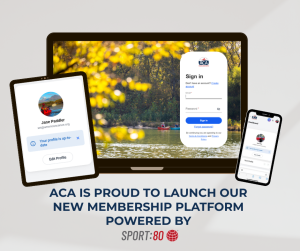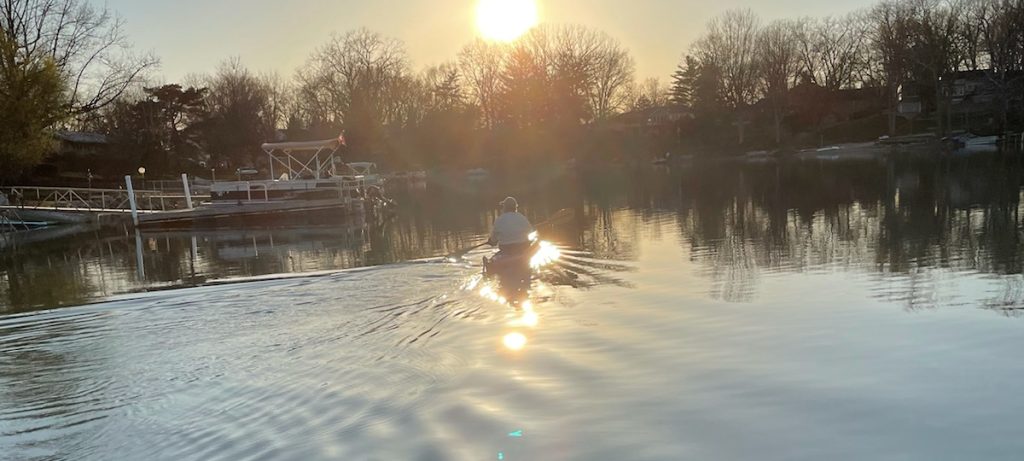
For decades, Steve Kelly has embodied the spirit of Olympic sport—not through medals or endorsement deals, but through quiet dedication, enduring integrity, and unrelenting discipline in seeking perfection, stroke after stroke. A true amateur in the noblest sense, Steve’s career spans from athlete to coach, administrator, official, and visionary leader, leaving an indelible mark on the sport of canoe sprint in the United States.
In a 1976 Sports Illustrated feature (pages 64–74), Steve offered a glimpse into the motivations of an Olympic-caliber athlete. “Most people just compete as individuals. That’s best,” he said. “When someone asks me why I do this, spend my own money and let a career go, I can’t think of anything to say except that I want to compete against the best athletes in the world. Because that means I’m one of the best athletes in the world. I’m proud of that.”
His words echoed the Olympic creed of Pierre de Coubertin, the founder of the modern Olympics, who said, “The most important thing in the Olympic Games is not to win but to take part, just as the most important thing in life is not the triumph, but in the struggle.” For Kelly, that struggle took root in the Inwood Canoe Club of Manhattan, where his older brother introduced him to paddling. Steve was driven by his love of the consistency and repeatability of each paddle stroke, and by his dream to compete against the world’s elite.
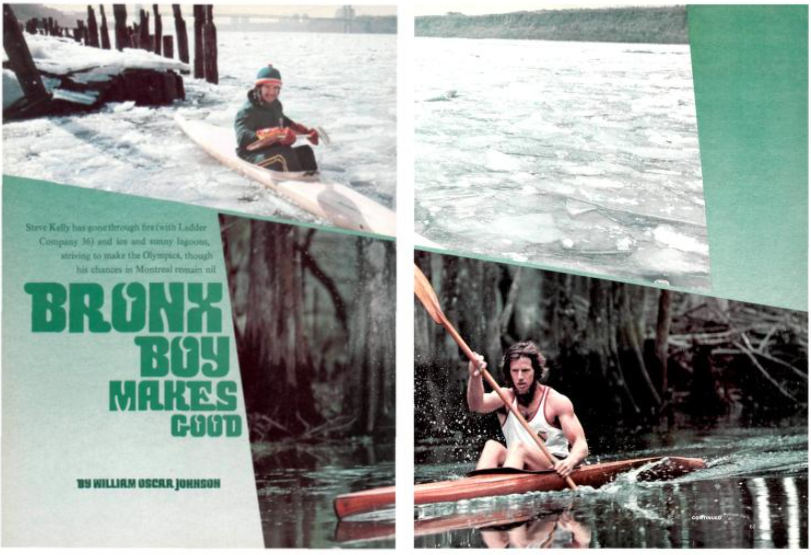
Cover Spread for the Sports Illustrated “Bronx Boy Makes Good” Feature Article about Steve Kelly and his hard effort to qualify for his second Olympic Games in Montreal in 1976.
From the Hudson to the World Stage
At 13, Steve attended his first Olympic team trials to watch his brother compete. From there began a lifelong pursuit of excellence in canoe sprint. Steve’s training was anything but glamorous—often carving strokes through the choppy and often frigid waters of the Hudson and Harlem Rivers. On weekends, his club would retreat to Lake Sebago for smoother water.
His Olympic journey began at the 1972 Munich Games—an experience seared into memory not only for its athletic significance, but for the tragedy that unfolded when the Palestinian militant organization, Black September, entered the Olympic Village and took Israeli Olympic team members hostage in a devastating event now referred to as the Munich massacre. Despite the politically charged nature of the Munich Games, Steve’s experience on the water reinforced his belief in sport’s deeper values. He went on to compete again at the 1976 Montreal Olympics, this time with his family cheering him on from the stands.
In both Olympic appearances, Steve raced as part of the U.S. Men’s K4 team in the 1000-meter event—sharing the boat with teammates, pursuing precision with every stroke, and proudly representing his country on the world’s greatest stage. In the United States, Steve also held the title of Men’s K1 1000m at 500m National Champion from 1974-1979.
Transitioning to Leadership & Building the Foundation for the Future
Following the U.S. boycott of the 1980 Moscow Olympics, Steve retired from competition at age 30. With two young children and mounting debt, he shifted his focus to coaching and leadership. He became an international official for the 1984 Los Angeles Games, then took on increasing administrative responsibility, eventually playing a pivotal role in organizing the 1996 Atlanta Olympic venues.
From his early days chasing perfect technique on a calm lake to the highest levels of Olympic leadership, Steve Kelly’s life has been dedicated to the betterment of canoe sprint. He’s seen the sport evolve dramatically: improved coaching, enhanced facilities, and the emergence of programs like paracanoe, which expanded access and opportunity.
Yet, he remains clear-eyed about the challenges—particularly the funding gap that still exists for many U.S. athletes. “Athletes are underfunded for the effort they are being asked to make,” he says, reflecting a core truth that continues to drive his advocacy.
For Steve, giving back to the sport has always been a moral imperative. “It’s the right thing to do,” he says simply. “The sport gave me so much. I wanted to see it improve. Every time the sport started to lose something; I wanted to help keep it moving forward.”
And move it forward he has. As a competitor, coach, builder, and steward of the sport, Steve Kelly has helped shape generations of paddlers and inspired a standard of excellence and service that few can match.
As Competition Director for Atlanta, he oversaw the creation of two new venues: Lake Lanier for sprint and rowing, and the Ocoee River for slalom—each a lasting legacy for American paddlesports.
Steve has been a constant in the evolution of U.S. canoe sprint—from club development and coaching networks to athlete support systems. He was present in Barcelona in 1992 when the U.S. qualified boats for every kayak final, a rare and proud achievement. In the most recent Games, Steve played a part in supporting the next generation of Team USA as the High Performance and Competitions Manager at the American Canoe Association.
Watching Jonas Ecker and Aaron Small, qualify for their first Olympics in Sarasota, Florida at the 2024 Pan American Championships—an event that Steve helped organize, remains one of his most cherished memories: “Seeing a good-looking K2 coming down in perfect harmony and succeeding—it captures the spirit of sprint canoeing.”
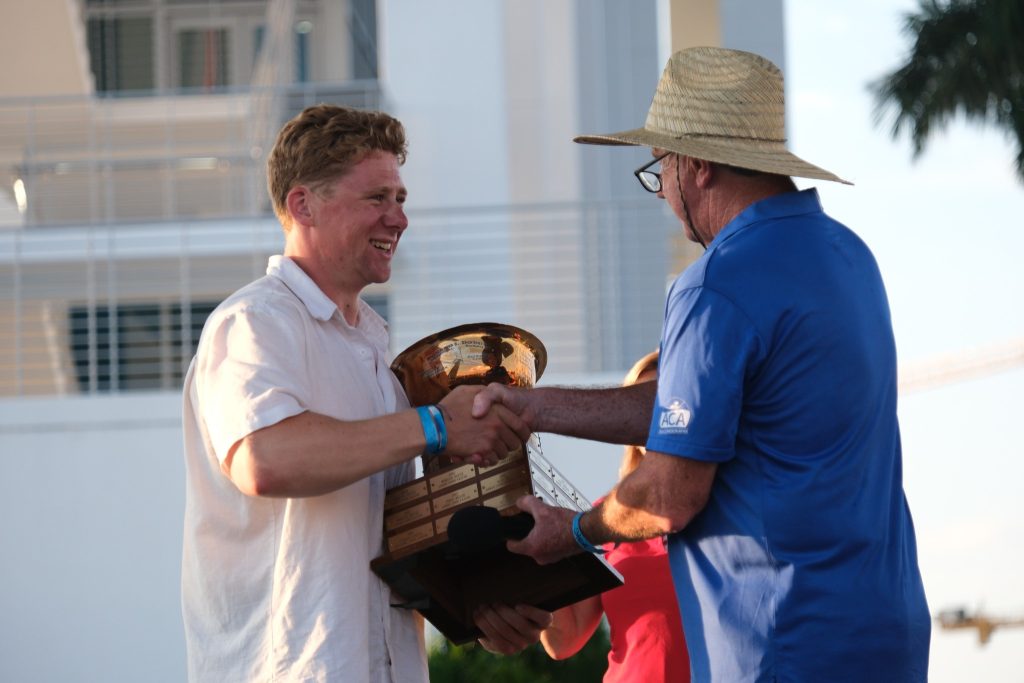
In 2023, Steve Presented the Henry and Eugene Krawaczyk Award to Jonas Ecker (left) and Aaron Small (not pictured) at the U.S. Canoe Sprint National Championships at Nathan Benderson Park, the same venue that Jonas and Aaron would qualify for the Paris 2024 Olympics 7 months later. / Image Credit: Jeff Wong
A Legacy of Discipline
When asked what trait he values most in a paddler, Steve answered without hesitation: “Discipline. A paddler who is serious about their commitment and dedicated to putting hours in on the water.”
To honor Steve’s extraordinary dedication to the sport, a new award will be introduced at Sprint Nationals: The Steve Kelly Award for Outstanding Discipline. This annual honor will be presented to an athlete who exemplifies the seriousness, consistency, and commitment that Steve has long championed.
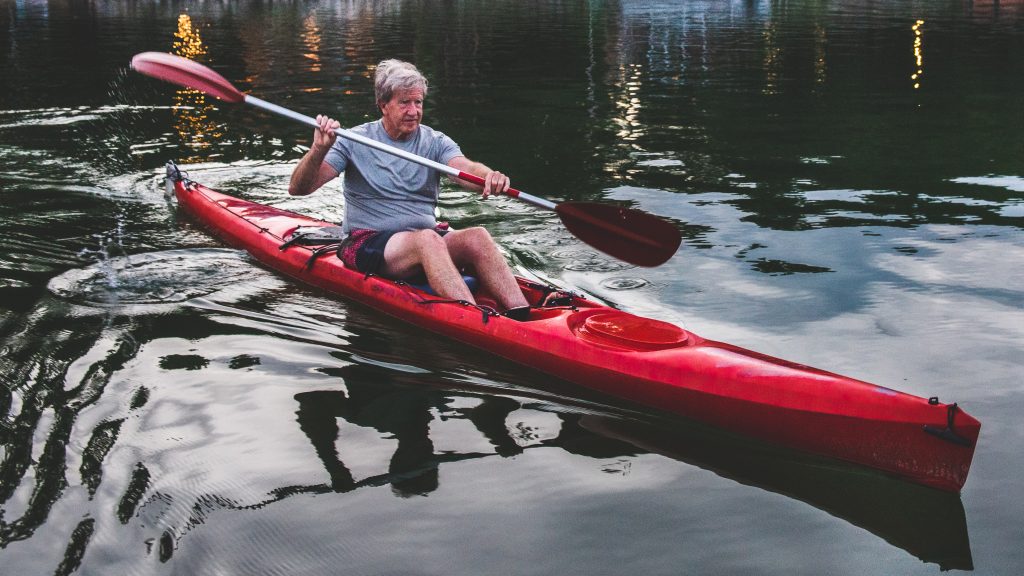
Steve Kelly, still practicing the perfect stroke.
Looking ahead to LA28, Steve offers practical advice for aspiring Olympians: “Start thinking how you can paddle 300 miles a month. Nothing takes the place of being in the boat and going fast.”
This advice is born not just of experience, but of a lifetime spent on the water, in service to a sport he loves deeply.
From his early days chasing perfect technique to overseeing Olympic venues and mentoring generations of athletes, Steve Kelly has shaped the sport of canoe sprint in America like few others. His legacy is one of discipline, devotion, and a quiet kind of greatness that lasts well beyond the podium.
And now, with an award bearing his name, Steve’s values will live on—in every stroke, every mile, every athlete who dares to dream, and every coach who helps them get there.

